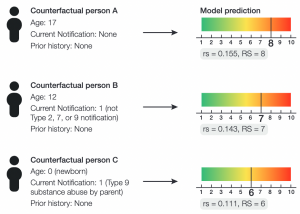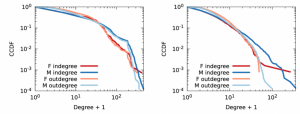We have 3 new papers that came out over the summer so far, on diverse, very interesting topics. The first authors in all 3 of these papers were our master students – showing how impactful good master projects can be:
- Failing Our Youngest: On the Biases, Pitfalls, and Risks in a Decision Support Algorithm Used for Child Protection, by T.M. Hansen, R. Sinatra, and V. Sekara, published at FAccT’24
Through a freedom of information request, we accessed a new algorithm of Danish child protection services to aid caseworkers in identifying children at heightened risk of maltreatment, named Decision Support, and conduct an audit. We find that the algorithm has significant methodological flaws, suffers from information leakage, relies on inappropriate proxy values for maltreatment assessment, generates inconsistent risk scores, and exhibits age-based discrimination. Given these serious issues, we strongly advise against the use of this kind of algorithms in local government, municipal, and child protection settings, and we call for rigorous evaluation of such tools before implementation and for continual monitoring post-deployment by listing a series of specific recommendations.

See also our accompanying policy paper published earlier. - superblockify: A Python Package for Automated Generation, Visualization, and Analysis of Potential Superblocks in Cities, by C.M. Büth, A. Vybornova, and M. Szell, published in The Journal of Open Source Software (JOSS)
superblockify is a Python package designed to assist in planning future Superblock implementations by partitioning an urban street network into Superblock-like neighborhoods and providing tools for visualizing and analyzing these partition results. A Superblock is a set of adjacent urban blocks where vehicular through traffic is prevented or pacified, giving priority to people walking and cycling. The potential Superblock blueprints
and descriptive statistics generated by superblockify can be used by urban planners as a first step in a data-driven planning pipeline for future urban transformations, or by urban data scientists as an efficient computational method to evaluate potential Superblock partitions.


The software is available at: superblockify.city - Traces of Unequal Entry Requirement for Illustrious People on Wikipedia Based on their Gender, by L. Krivaa and M. Coscia, published in Advances in Complex Systems
In this paper, we study issues of fair gender representations for people in history noted by multiple language editions of Wikipedia: are women underrepresented on Wikipedia? We do so via a combination of natural language processing and network science. Our results indicate that there is indeed a higher bar for women to have their own biographical page on Wikipedia: women are only included when they have more significant connections than men to the rest of the network. There are visible effects of the initiatives Wikipedia is taking to fix this issue, showing that the gap is narrowing, which validates our interpretation of the data.

